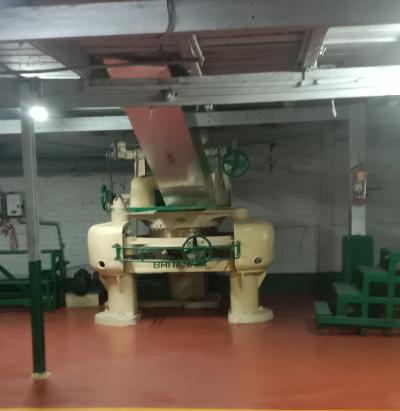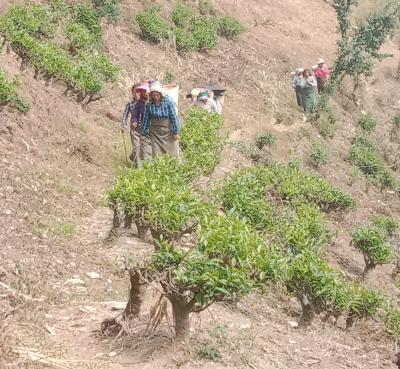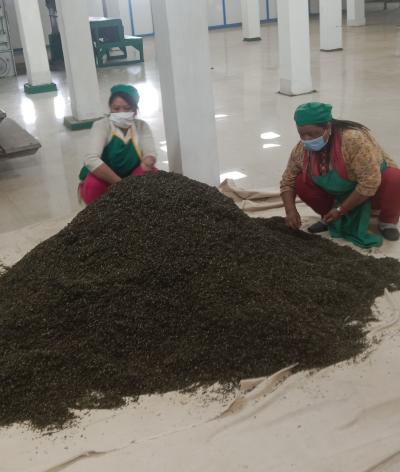As you step into the historic factory at Makaibari Tea Estate, a sense of serenity washes over you. The soft glow of natural light illuminates the rustic, earth-toned walls, while the sweet aroma of tea leaves fills the air.
In this sacred space, time stands still. Small groups of women, their hands moving with precision and purpose, carefully separate unwanted items from tiny heaps of tea. Their concentration is palpable, as if they're performing a delicate ritual.
In the distance, the gentle hum of roller machines provides a soothing background melody, adding to the enchanting ambiance. The atmosphere is almost meditative, as if a sacred ceremony is underway.

Welcome to the Makaibari Tea Estate Factory, the oldest in Darjeeling and one of the world's oldest and most revered tea factories. Here, tea is not just a beverage, it's a way of life. Every leaf is carefully crafted, every blend meticulously balanced, and every cup infused with love and devotion.
In this hallowed hall, the art of tea-making is elevated to an act of worship. Every moment, every movement, and every decision is guided by a deep respect for tradition, quality, and the sacred bond between nature and humanity.
The serene atmosphere of the Makaibari Tea Estate Factory is punctuated by the occasional booming voice of Sanjay Das, the manager and master conductor of this symphony of tea production.
"I need to raise my voice sometimes to ensure the smooth flow of operations," Das explains to World Tea News. "My voice may be the only disruption to the tranquil process of tea crafting in this factory, but it's a necessary one."
Das's commanding tone is a testament to his passion for perfection and his commitment to upholding the legacy of Makaibari.
Nestled in the emerald hills of Kurseong in Darjeeling, Makaibari Tea Estate stands as a beacon of organic and biodynamic tea cultivation. Established in 1859, this 150-year-old estate seamlessly blends sustainable farming practices with the preservation of its natural ecosystem.
As you step into Makaibari, you're enveloped by the soothing hues of green and gold. Rolling hills, lush forests, and tea bushes stretch as far as the eye can see, creating a breathtaking tapestry of natural beauty. The female tea leaf pluckers traverse through these steep Himalayan mountain slopes like mountain goats, their grips as steady as they cling on to pluck the finest of the leaves.
“These workers are used to climbing these hills very comfortably, without any risk; they are born in these hills,” Das explained.
Makaibari has been at the forefront of holistic farming since the early 1980s, introducing biodynamic agriculture to the tropics. This pioneering approach views soil fertility, plant growth, and ecological balance as interconnected, emphasizing harmony between the land and the cosmos.
At the heart of the estate stands the 150-year-old tea factory, a living testament to time-honored craftsmanship. Built from wood, bamboo, and cast iron, the factory has evolved over time, showcasing a rare example of industrial archaeology.
Activities here start early in the morning and continue till late at night during the peak production season. “Workers are on shift duties,” Das said.
Fifty to sixty workers, mostly women, are engaged in the factory. Makaibari has 550 workers, out of which 330 are women.
The Makaibari Tea Estate has become a magnet for tourists and tea enthusiasts from around the world. To cater to the influx of visitors, the authorities have created a separate glass enclosure, offering a glimpse into the factory's inner workings.
"One can witness the activities inside the factory through the glass walls of this hall built specifically for tourists," explains Sanjay Das. This unique setup allows visitors to observe the intricacies of tea production while minimizing disruptions to the factory's operations.
The popularity of Makaibari has also led to the establishment of a Taj Hotels facility on the premises. Additionally, numerous home-stays in and around the tea estate, mostly owned by Makaibari workers, offer visitors a chance to immerse themselves in the local culture and experience the authentic charm of rural India.

Makaibari follows an integrated forest management system, practicing permaculture where tea bushes thrive within a multi-tier ecosystem. Unlike monocultural farms, 70% of the estate remains under forest cover, providing a sanctuary for endangered species, including panthers, tigers, birds, and butterflies.
The estate became the world's first certified organic tea estate in 1988, relying on natural cycles and biodiversity rather than synthetic inputs. This approach sustains soil health, ecosystems, and communities.
At Makaibari, the tea bushes are nurtured using a natural and sustainable approach.
"We don't use any chemicals on our tea bushes," Das explains. "Instead, we rely on cow dung collected from nearby villages, where many of our workers reside."
This innovative approach not only promotes eco-friendly farming practices but also provides an additional source of income for the workers. "By supplying cow dung, our workers earn extra income, which benefits their families and the local community," Das adds, highlighting the estate's commitment to social responsibility.
Makaibari has been a pioneer in Fairtrade since 1993, setting benchmarks in corporate social responsibility. Its initiatives were adopted by the Fairtrade Labelling Organisation (FLO), bringing global recognition to the estate's ethical practice.
The quality of tea produced at Makaibari is unparalleled, consistently fetching record-breaking prices over the years. Locals swear by its exceptional flavor, with many considering it the best tea in Darjeeling.
"I'm accustomed to drinking Makaibari tea, and it's incomparable to teas from other gardens," says Sawan Bhujel, a local villager who runs a taxi business and a home-stay at Makaibari. The estate's workers are provided with a pouch of tea monthly as ration, a testament to the tea's exceptional quality.
Makaibari factory produces about one lakh kg of tea annually, and the bulk of it is of premium quality, fetching record prices. Nearly 75 percent of tea produced in this factory is exported.

According to Laxmi Limbu Kaushal, a senior official of the company, Makaibari's distinctive flavor profile can be attributed to its strategic location. Nestled between the high mountains of Darjeeling and the plains of North Bengal, the estate benefits from a unique combination of climatic and geographical factors resulting in a truly special tea.
Makaibari today is more than a tea estate; it's a legacy, a movement, and a vision for a sustainable future. Here, tea is not just cultivated, but celebrated—a symbol of harmony between nature, people, and the environment.
Plan to Attend or Participate in the 2026 World Tea Expo, March 23-25, 2026, Las Vegas, Nevada.
To book your sponsorship or exhibit space at World Tea Expo, or to inquire about advertising and sponsorship opportunities at World Tea News, contact:
Ellainy Karaboitis-Christopoulos, Business Development Manager, Questex
Phone: +1-212-895-8493; Email: [email protected]
Looking for professional tea education, certifications, and more? Visit World Tea Academy and register for courses today!
Also, be sure to stay connected with World Tea Expo on social media for details and insights about the event. Follow us on X, Facebook, Instagram and LinkedIn.
